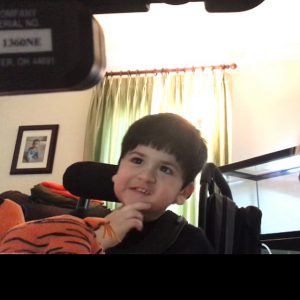 Have you ever heard the expression “As wrong as a vegetarian eating animal crackers?” That was kind of how I felt the other day after a session with Joey.
Have you ever heard the expression “As wrong as a vegetarian eating animal crackers?” That was kind of how I felt the other day after a session with Joey.
I couldn’t believe it when I arrived at Joey’s house and found that animal sounds had been added to his device over the weekend. This was perfect because I’d brought the book What’s Your Sound, Hound the Hound? by Mo Willems to read with Joey. In this book a cat goes around and asks all his animal friends what they say. I thought it would be perfect for Joey because he like to make animal noises sometimes. Once I saw that the animal sounds were available to him I was even more excited. This is perfect! I thought. Now he can use the eye gaze and his voice to read the book with me.
Joey did not agree.
The animal noises sounded fairly realistic, and were loud and startling coming from the normally slightly robotic computer screen. Joey did not seem too overly thrilled to have them on his screen, although he continued to click them, as though he was exploring the buttons to see what each one did. “Quack bad” he said, after he hit on one for the first time. But he continued to explore, “baaaa, pull, neigh, easy”
In the beginning I offered him the book What’s Your Sound? as one of his choices, but he consistently chose whatever other book I brought, so eventually I just started reading What’s Your Sound? Before we made it through the first page Joey was crying. The crying turned to sobbing. Eventually we moved him out of his chair and onto the floor, where he stopped crying until he saw the cover of the book again.
I had never seen Joey so upset. It was heartbreaking to watch him become inconsolable and not be able to fully understand why. Was it the book, or the animal noises? Was he originally just a little upset, but became more upset because we couldn’t understand what he was communicating to us? We were missing his message, and it was frustrating to be upset and not be able to have anyone know why.
The words he selected after he became upset were “sad mad thirsty animal push little quiet seahorse what close love love.” It was hard to apply meaning to it and be sure that each word was meaningful or hit by accident. “Animal push little quiet” may be about wanting the animal buttons to be quiet. Does he love the seahorse because it’s quiet? Did he want the book closed? He certainly was sad and mad, and that seemed to apply.
It wasn’t until later when we were considering what about the book would have upset him. We weren’t even able to read it together – had he read it before? In thinking about the book his grandmother gently pointed out that the book is about many animals sharing their animal noises -until the bunny comes along. When everyone else asks the bunny “What’s your sound” the bunny is silent. He can’t talk although he’s surrounded by friends who can.
As wrong as a vegetarian eating animal crackers.
I felt like I was hit in the stomach. How had I missed that? It hadn’t even occurred to me to connect Joey to the rabbit until that moment, but once I saw it I couldn’t stop. Poor kid. If he recognized the book from a previous experience he certainly was upset by the story. Did the bunny’s feelings hit too close to home? Did it remind him too deeply of his daily frustration of being different and slightly separated from the ones he loves?
To make it worse, if that was what was upsetting, we only reinforced the idea that not speaking is isolating when we were not able to understand his tears.
We don’t really know why he was upset. No one knows if Joey read the book before, and later Joey’s mother shared that over the weekend he’d became upset by the loud animal noises so she took him off his device.
Regardless of why Joey was upset, it highlighted to me why it is so important to keep working to give this boy a voice. He has so much to say, and when he is upset he needs us to be able to connect with him and understand the cause behind his sadness or anger. Another four year old recently looked at me and said “I hate sharing. I’m mad at you.” He cried and cried as I commiserated that I understood sharing was hard, and frustrating. We’re going to keep sharing and make it easier to do, I promised him. I was able to say “I understand your feelings and I’ll work with you on this skill.” I wish I could do that with Joey. He has the right to be sad, frustrated, or angry with the world, and for us to listen, commiserate, and help him work on whatever is upsetting him.


